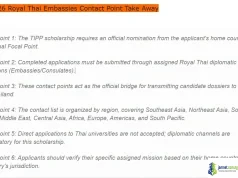This guide reveals the key qualities scholarship committees look for beyond grades, with practical steps to help you win


Do you ever wonder why some students win scholarships easily while others with similar grades do not? It is because getting a scholarship is not just about being smart. It is about showing that you are a well-rounded person with a strong purpose.

Join our Telegram Channel for Instant Scholarship Updates
Scholarship committees want to invest in students who will bring value to their communities. The good news is that these are all qualities you can build. This guide will show you what makes a student stand out and how you can get ready to win.
Top Qualities of Scholarship Winners
While good grades are the first step, committees also look for future leaders who will use their education to make a difference. These are the top 10 things they look for in an application:
1. Great Grades and a Strong Work Ethic
Your grades are the first thing a committee sees. Consistent good performance, especially in challenging classes, shows that you are dedicated to learning and can handle a heavy workload. This proves you have the discipline to succeed in your studies.
2. Involvement Outside of the Classroom
Successful applicants do not just focus on schoolwork; they are active in their community. Whether you are leading a club, playing a sport, or taking part in school events, these activities show you can manage your time and work well with others.
3. The Ability to Tell Your Story
You might have the best grades, but if you can not explain your goals, you will not stand out. Winners know how to write and speak clearly about their personal journey. By sharing honest stories about your passions and what you have overcome, you make your application memorable.
4. A Clear Vision for the Future
Committees want to help students who know what they want to achieve. Winners have a clear idea of why they are studying their chosen field and how the scholarship will help them reach their long-term goals.
5. A Record of Community Service
Having a history of helping others shows you care about more than your own success. Committees value students who are compassionate and responsible. They want to invest in people who will one day use their knowledge to positively impact society.
6. A Strategic Approach to Applying
You do not need to apply for every scholarship. Winners are smart about their time and focus on opportunities that fit their skills, background, and goals. This targeted approach makes their applications stronger and gives them a better chance of winning.
7. A Desire to Make a Global Impact
Scholarship committees are often looking for students who think big. Winners show how their education will not only benefit them but also help their community, their country, or even the world. This shows you are ready to be a leader.
8. The Strength to Overcome Challenges
Many winners have faced and overcome difficult situations. They use these experiences to show their determination and ability to grow. By talking about how you have handled setbacks, you prove you can succeed no matter what comes your way.
9. A Demonstrated Financial Need
Many scholarships are designed to help students who need financial support to continue their education. Being open and honest about your financial situation, and explaining how the scholarship will make a difference, can be a major factor in your favor.
10. Strong Recommendations
A great letter of recommendation from a teacher, coach, or mentor can set you apart. It shows that people who know you well believe in your potential and work ethic. Building these relationships is an important part of a successful application.
Practical Steps to Stand Out
Now that you know what to focus on, here are some ways to start today. For grades, always take the most challenging courses you can handle and ask teachers for help when you need it. To show involvement, find a cause you truly care about and seek out a leadership role, even a small one. To improve your storytelling, keep a personal journal and practice writing about your experiences. Finally, start building relationships with teachers and mentors now, so you will have strong recommendations later on.
Conclusion
Getting a scholarship is about being prepared and thoughtful. By showing dedication in your schoolwork, leadership in your activities, and a clear vision for your future, you can prove that you are a valuable investment.
Be sure to tell your personal story and show how your goals connect to the scholarship’s mission. The more effort you put into showing your best self, the closer you will get to funding your education and creating the future you deserve.
Frequently Asked Questions (FAQs)
1. How many scholarships should I apply for?
There is no magic number. It is better to apply for a few scholarships that are a perfect match for you than to apply for many that do not fit your profile. Be strategic and focus your efforts on the best opportunities.
2. Do my grades have to be perfect?
No, perfect grades are not required for most scholarships. While strong academics are important, committees also consider your extracurricular activities, leadership experience, community service, and personal essays. A balanced profile is often more valuable than a perfect GPA.
3. What if I do not have a leadership role?
You do not have to be a club president to show leadership. You can demonstrate leadership through any activity where you take initiative, mentor others, or organize an event. Think about times you have helped a team, led a project, or found a solution to a problem.
4. How important is the essay?
The essay is one of the most important parts of your application. It is your chance to tell your personal story, show your passion, and explain why you deserve the scholarship. It is where you can truly stand out from other applicants.
5. Should I include my financial need in the essay?
If the scholarship committee asks about financial need, it is important to be honest and clear. Explain how the scholarship will help you achieve your goals and make a difference in your life.
6. Where can I find scholarships?
You can find scholarships on school websites, in local community groups, on scholarship search engines, and through professional organizations related to your future career. Do your research and look for scholarships that align with your background and goals.
7. How can I get a strong letter of recommendation?
To get a strong letter, ask a teacher or mentor who knows you well. Give them plenty of time and provide them with your resume, essay, and a list of your achievements to help them write a detailed letter about your skills and character.
8. What should I do if I get rejected?
Rejection is a normal part of the process. Do not let it discourage you. Review your application to see if there is anything you can improve for the next time, but do not dwell on it. Just keep applying.
9. How do I prove community service?
You can prove your service by keeping a record of your volunteer hours, a list of the organizations you have worked with, and a short summary of the projects you have helped with.
10. What if I am not a perfect candidate?
No one is a perfect candidate. Scholarship committees are looking for dedicated and passionate students who are a good fit for their program. Focus on highlighting your unique strengths and how you will use the opportunity to make an impact.













